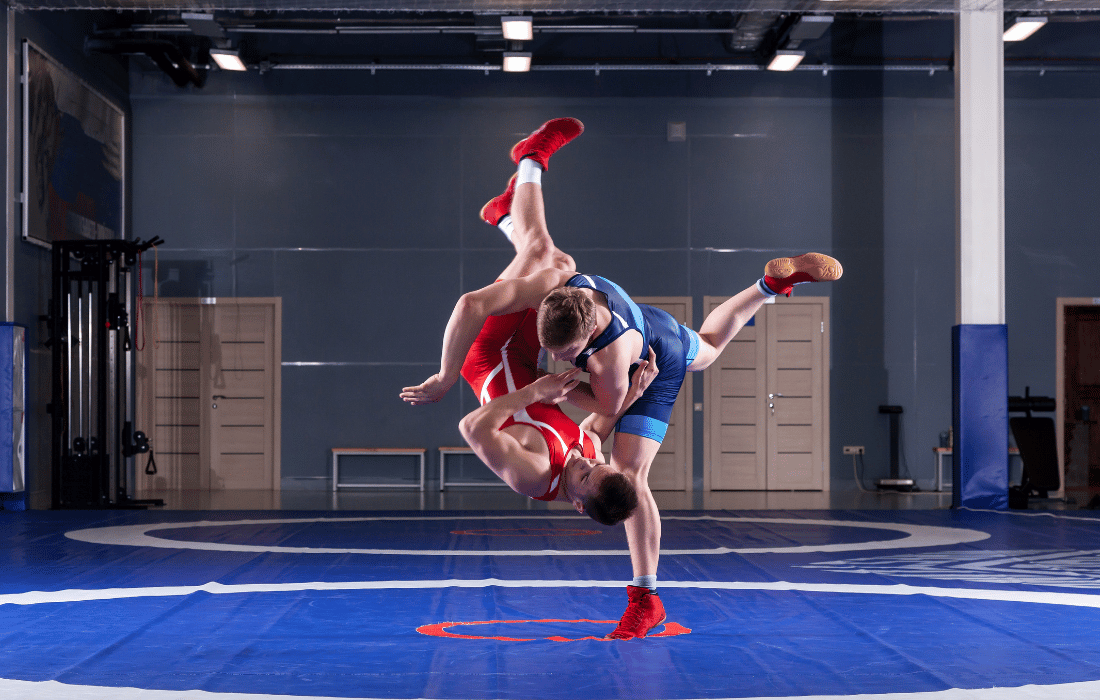Wrestling, often hailed as the world’s oldest sport, has a storied history that intertwines deeply with the Olympic Games. This sport’s origins stretch back to ancient civilizations, where it was celebrated for its raw physicality, strategic depth, and the timeless appeal of one-on-one competition. Wrestling’s journey through the ages, especially within the context of the Olympics, is a tale of tradition, perseverance, and an unwavering community determined to keep their beloved sport alive on the world stage.
Ancient Beginnings: Wrestling’s Early Roots
The origins of wrestling can be traced back to prehistoric times, evidenced by cave paintings in France depicting grappling bouts from as far back as 15,000 years ago. This primal contest of strength and technique evolved into a structured sport in ancient civilizations like Mesopotamia, Egypt, and Greece.
In ancient Greece, wrestling was a cornerstone of the Olympic Games, which began in 776 BC. Known as “pale,” it was one of the five events in the pentathlon, symbolizing the ideal balance of physical prowess and skill. Greek wrestlers were celebrated as heroes, and their techniques and philosophies influenced the sport for centuries to come. The famous wrestler Milo of Croton, a six-time Olympic champion, became a legendary figure, illustrating the sport’s prominence in ancient Greek culture.
Wrestling wasn’t just a sport in Greece; it was a crucial part of their education system. Boys were trained in wrestling as part of their physical education to develop strength, discipline, and tactical skills. It was believed that the virtues learned on the wrestling mat translated into virtues necessary for success in life and battle.
Wrestling in the Modern Olympics: Revival and Evolution
Fast forward to the late 19th century, when the modern Olympic Games were established by Pierre de Coubertin in 1896. Wrestling was reinstated as a key event, acknowledging its historical significance and enduring appeal. The first modern Olympic Games in Athens featured Greco-Roman wrestling, a style that emphasizes upper body strength and forbids holds below the waist.
The inclusion of freestyle wrestling in the 1904 St. Louis Olympics expanded the sport’s reach, allowing a different set of techniques and strategies that included leg attacks and more varied grappling maneuvers. This diversity enriched the Olympic wrestling program, making it more inclusive and appealing to athletes from various wrestling traditions worldwide.
One of the most significant moments in modern Olympic wrestling history occurred in 1920, when Estonian wrestler Martin Klein won the silver medal after a grueling 11-hour match against Alfred Asikainen of Finland. This match, the longest in Olympic history, epitomized the endurance and determination required in wrestling. Klein’s epic bout highlighted the sheer physical and mental demands of the sport, etching his name in the annals of Olympic lore.
The Golden Era: Wrestling’s Global Influence
Throughout the 20th century, wrestling solidified its place in the Olympics, attracting participants and fans from around the globe. Countries like the Soviet Union, the United States, Japan, and Turkey emerged as wrestling powerhouses, producing legendary athletes who inspired generations.
Icons such as Alexander Karelin, known as the “Russian Bear,” dominated Greco-Roman wrestling with his incredible strength and technique, winning three Olympic gold medals and one silver from 1988 to 2000. Karelin’s dominance was so profound that he went undefeated for 13 years, making him one of the most formidable athletes in Olympic history.
Similarly, American freestyle wrestler Dan Gable became a symbol of excellence, going undefeated in international competition and winning gold at the 1972 Munich Olympics without conceding a single point. Gable’s dominance and his later success as a coach at the University of Iowa, where he led the team to 15 NCAA titles, made him an enduring figure in the wrestling world.
The global reach of wrestling fostered a sense of camaraderie and respect among athletes from diverse backgrounds. Wrestling’s emphasis on discipline, resilience, and sportsmanship resonated across cultures, making it a universal sport that transcended geopolitical boundaries.
In Japan, Shozo Sasahara became a national hero by winning the country’s first wrestling gold medal in the 1956 Melbourne Olympics. His victory helped popularize the sport in Japan, leading to a rich tradition of wrestling excellence that continues to this day. Sasahara’s triumph was a source of national pride and inspired countless young athletes in Japan to take up the sport.
A Shocking Blow: Wrestling’s Olympic Exclusion in 2013
Despite its rich history and widespread popularity, wrestling faced a devastating setback in 2013. The International Olympic Committee (IOC) announced its decision to exclude wrestling from the 2020 Olympic Games, citing the need to refresh the program and maintain its relevance.
The wrestling community was stunned. How could a sport so deeply intertwined with the Olympics’ history be cast aside? The decision ignited a global outcry, uniting wrestlers, coaches, fans, and sports officials in a fierce campaign to reinstate the sport. This unprecedented challenge galvanized the wrestling community, showcasing their passion and determination to preserve their legacy.
The Fight for Reinstatement: A Community United
The wrestling community’s response to the IOC’s decision was swift and resolute. Under the banner “Save Olympic Wrestling,” a worldwide movement emerged, highlighting the sport’s historical significance, cultural diversity, and profound impact on athletes’ lives.
Key figures in the wrestling world, such as American wrestler and Olympic gold medalist Jordan Burroughs, played pivotal roles in advocating for the sport’s reinstatement. Burroughs, along with other prominent wrestlers and coaches, engaged in media campaigns, social media outreach, and direct appeals to the IOC.
The United World Wrestling (UWW), the international governing body for the sport, implemented significant reforms to modernize and enhance wrestling’s appeal. These changes included new weight categories, rule adjustments to make matches more dynamic and spectator-friendly, and efforts to promote gender equality by expanding women’s wrestling.
The support extended beyond the wrestling community. Athletes and fans from various sports rallied behind the cause, recognizing the importance of preserving wrestling’s place in the Olympics. Social media campaigns gained momentum, with the hashtag #SaveOlympicWrestling trending worldwide. The overwhelming support underscored the sport’s deep cultural significance and its role in the Olympic tradition.
Triumph and Reflection: Wrestling’s Return to the Olympics
The relentless advocacy and strategic reforms paid off. In September 2013, just seven months after the initial decision, the IOC voted to reinstate wrestling for the 2020 Tokyo Olympics. The announcement was met with jubilation and relief within the wrestling community, celebrating the hard-fought victory that secured their sport’s future on the world stage.
Wrestling’s reinstatement was more than a triumph for the sport; it was a testament to the power of unity, resilience, and the enduring spirit of the wrestling community. It underscored the importance of preserving traditions while embracing innovation to stay relevant in a rapidly changing world.
Reflecting on this victory, Nenad Lalović, president of United World Wrestling, expressed the community’s collective sentiment: “Wrestling is more than a sport. It is a way of life that teaches values such as perseverance, respect, and determination. We fought for our place in the Olympics, and we emerged stronger and more united than ever.”
Wrestling Today: Embracing Diversity and Innovation
As wrestling continues to evolve, it remains deeply rooted in its traditions while embracing change to stay vibrant and inclusive. The introduction of women’s wrestling in the 2004 Athens Olympics marked a significant milestone, recognizing and promoting gender equality within the sport. Female wrestlers like Japan’s Kaori Icho and America’s Helen Maroulis have become role models, inspiring young athletes and showcasing the sport’s broad appeal.
Kaori Icho, in particular, made history by becoming the first woman to win four consecutive Olympic gold medals in wrestling (2004, 2008, 2012, 2016). Her achievements have cemented her legacy as one of the greatest wrestlers of all time, male or female. Icho’s dominance on the mat and her humble demeanor off it have made her an icon in the sport.
In recent years, the UWW has focused on increasing wrestling’s global reach and visibility. Efforts to promote wrestling in developing regions, support grassroots programs, and leverage digital platforms have helped attract a new generation of fans and participants. The emphasis on storytelling and personal narratives has also humanized the sport, highlighting the journeys and struggles of individual wrestlers.
Take the story of Lopez Lomong, a South Sudanese-born American wrestler who escaped a war-torn country and pursued his Olympic dream. Lomong’s journey from a refugee camp to representing the United States in the Olympics is a testament to the transformative power of sport and the universal appeal of wrestling.
The Wrestlers’ Path to Mixed Martial Arts
While wrestling is one of the most demanding sports, both physically and mentally, it has historically received little exposure and financial reward compared to other sports. Olympic and collegiate wrestlers often face the harsh reality that their sport, despite its rich heritage and intense discipline, does not offer lucrative career opportunities.
Many top wrestlers have turned to mixed martial arts (MMA) to pursue higher-paying careers. The skills developed in wrestling—takedowns, control, and grappling—translate exceptionally well to MMA, making wrestlers highly successful in this arena. Notable examples include:
- Randy Couture: An Olympic Greco-Roman wrestler who became a six-time UFC champion.
- Daniel Cormier: An Olympic wrestler and former captain of the U.S. Olympic team, who achieved championship status in both the light heavyweight and heavyweight divisions in the UFC.
- Ben Askren: A two-time NCAA wrestling champion and Olympian, who made a name for himself in Bellator and the UFC.
- Henry Cejudo: An Olympic gold medalist in freestyle wrestling who became a two-division UFC champion.
These athletes have found fame and fortune in MMA, highlighting the contrast between the financial opportunities in wrestling and mixed martial arts. The transition to MMA not only provides better financial stability but also greater exposure and recognition.
The Enduring Legacy of Olympic Wrestling
Wrestling’s journey through the annals of the Olympic Games is a story of perseverance, passion, and an unwavering commitment to tradition. From its ancient origins to its modern evolution, wrestling has remained a symbol of human strength, strategy, and resilience.
The wrestling community’s successful campaign to reinstate the sport in the Olympics demonstrated the profound connection between wrestling and its global fan base. It highlighted the importance of preserving the cultural and historical legacy of sports, even as we adapt to contemporary challenges.
As we look to the future, wrestling’s place in the Olympics serves as a reminder of the timeless appeal of this ancient sport. It embodies the essence of competition, the thrill of one-on-one combat, and the enduring spirit of athletes who push their limits to achieve greatness. The wrestling community’s fight to keep their sport in the Olympics is a testament to the power of unity, passion, and the unwavering belief in the value of tradition.
In celebrating wrestling’s rich history and its triumphant return to the Olympics, we honor not only the athletes who have graced the mats but also the enduring spirit of a sport that has stood the test of time. Wrestling’s legacy is a testament to the power of human determination, the beauty of physical competition, and the unbreakable bond between athletes and their fans.
Conclusion: A Sport for the Ages
Wrestling’s history in the Olympics is a microcosm of the broader human experience. It reflects our innate desire to test our limits, the importance of perseverance in the face of adversity, and the value of community and tradition. As the wrestling community continues to evolve and grow, it remains committed to preserving the sport’s rich heritage while embracing the opportunities of the future.
The battle to keep wrestling in the Olympics was a defining moment that underscored the sport’s significance and the passion of its supporters. It serves as a powerful reminder that the Olympic Games are more than just a competition; they are a celebration of our shared history, values, and aspirations.
As we cheer for wrestlers on the Olympic stage, we are not just witnessing a contest of strength and skill; we are honoring a tradition that has shaped human history and will continue to inspire future generations. Wrestling, with its ancient roots and modern appeal, truly embodies the timeless spirit of the Olympics, reminding us all of the enduring power of sport to unite, inspire, and uplift.
From ancient Greek wrestlers like Milo of Croton to modern legends like Jordan Burroughs and Kaori Icho, the sport has evolved but has always maintained its core values of strength, technique, and respect. Wrestling is more than just a sport; it’s a global community, a source of inspiration, and a testament to the enduring human spirit.
So, the next time you watch a wrestling match at the Olympics, remember the rich history and the fierce battle that kept it there. Celebrate the athletes, the traditions, and the incredible journey that wrestling has taken to remain a cornerstone of the Olympic Games. This is wrestling – a sport for the ages, and a testament to the power of human determination and the unyielding spirit of a global community.







